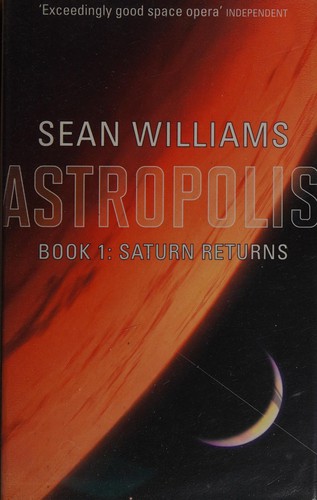Keith Stevenson reviewed Saturn returns by Sean Williams (Astropolis -- bk. 1)
Review of 'Saturn returns' on 'Goodreads'
4 stars
As I’ve said before, Sean is one of Australia’s most prolific,
inventive and successful speculative fiction writers in this
or, probably, any other era. He’s also an incredibly nice
person, which makes him impossible to hate; believe me,
I’ve tried. He’s written thirteen science fiction books (although it’s hard to
keep count, so many have been reprinted), including the excellent Orphans
of Earth trilogy with fellow Australian writer Shane Dix. Saturn Returns
marks a return to his solo SF writing at novel length.
In the 879th millennium, former mercenary commander, Imre Bergamasc,
is brought back to life in curious fashion. His genetic information and personality
had been inscribed in a continuous groove running round and round the
inside of a huge metal drum (much like an inside out phonograph cylinder)
which was in turn destroyed 150,000 years before the book begins and then
painstakingly reassembled (although with some important pieces missing) by
the Jinc, a disseminated personality seeking to find the true expression of God,
the wellspring of the first life in the universe. The Jinc use the information to
recreate Bergamasc as a living being, but with some important differences:
some parts of his memory are missing, due to gaps in the reconstructed drum;
and they make him into a woman, which really messes with his ability to adapt
to this new environment. There’s also the question as to why the drum carrying
Bergamasc’s ‘essence’ was nuked out of existence. Given it was safely orbiting a
thousand light years outside the galaxy and supra-light craft don’t exist, that is
one hell of a grudge someone carried.
In the universe of Saturn Returns, humanity can be divided into three main
types: the Primes who, although they take advantage of genetic manipulation
and anti-agathics, are rugged individuals (when they die, that’s it); the
Singletons who have multiple copies of themselves roaming around acting
independently of each other and—depending on the personality—meeting up
to compare notes or to act in concert; and the Forts, vastly intelligent intellects
disseminated through countless living beings—frags—who act as their hands,
feet, eyes and ears. The Forts are able to control their various ‘appendages’ even
when dispersed across light years by virtue of a ‘Q loop’, perhaps some kind of
quantum entanglement effect, which allows instantaneous contact.
Bergamasc and his mercenaries initially fought against the Forts in the
name of individuality, before acknowledging the important role the Forts
played in bringing order to the Continuum and completing various black ops
on their behalf, like a bunch of kick-arse psychohistorians on steroids.
Bergamasc’s escape from the Jinc and arrival in the lightcone of his
own galaxy brings a sobering revelation: the Slow Wave, a phenomenon of
unknown origin, has propagated across the galaxy destroying the Q loop and
the Forts’ ability to function. Without their civilising influence, much of the
galaxy is reverting to barbarism (echoes again of the Foundation books) and,
it seems, everyone wants a piece of Imre Bergamasc. And as he discovers more
about himself and what he’s supposed to have done, he begins to question
whether he used to be a very nice person at all, and considers what—given a
second chance—he’d like to do about that.
There’s a lot of humour in Saturn Returns, not least the reference to
the spatial anomaly of ‘Cat’s Arse’ — which has been pondered by many of
us for a long time — and the character of Render, who speaks only in the
lyrics of Gary Numan (and very effectively so). There’s also a great deal of
hope, particularly the fact that, despite convergent technology, AI, uploading,
genetic manipulation and so on, there are still recognisably human individuals
in the universe, who continue to play a role in our collective future.
The structuring of the story shows a great deal of skill. The nature of
Bergamasc’s amnesia means that there is a lot of backfilling on previous
events by the other characters he encounters. In the hands of a lesser writer,
this could have slowed the narrative flow, but not here. The other factor is the
way Sean deals with complex scientific concepts effortlessly, accessibly, and
always in support of plot progression.
Sean has produced some good work in the past; he’s had the opportunity
to flex his writing muscles in a wide variety of projects. In Saturn Returns, I
felt a new assuredness, a strength of voice that was compellingly entertaining
and thought-provoking. Saturn Returns is Sean’s best yet—go out and buy it.

